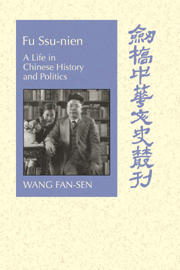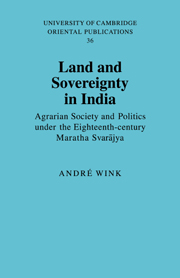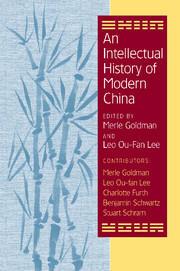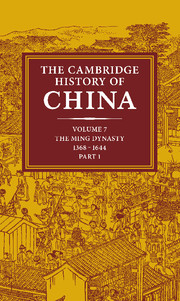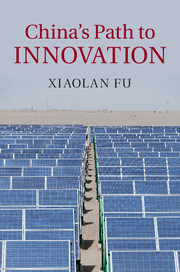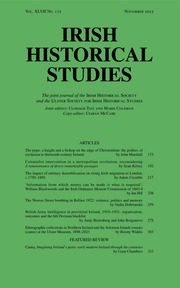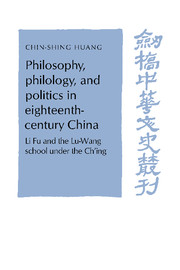
Philosophy, Philology, and Politics in Eighteenth-Century China
Li Fu and the Lu-Wang School under the Ch'ing
Part of Cambridge Studies in Chinese History, Literature and Institutions
- Author: C. S. Huang, Academia Sinica, Taipei, Taiwan
- Date Published: December 2003
- availability: Available
- format: Paperback
- isbn: 9780521529464
Paperback
Other available formats:
Hardback, eBook
Looking for an examination copy?
This title is not currently available for examination. However, if you are interested in the title for your course we can consider offering an examination copy. To register your interest please contact [email protected] providing details of the course you are teaching.
-
This book explains the general intellectual climate of the early Ch'ing period, and the political and cultural characteristics of the Ch'ing regime at the time. Professor Huang brings to life the book's central characters, Li Fu and the three great emperors he served: K'ang-hsi, Yung-cheng, and Chien-lung. Although the author's main concern is to explain the contributions of Li Fu to the Lu-Wang school of Confucianism, he also gives a clear, succinct account of the Lu-Wang and Ch'eng-Chu schools from the twelfth century to the eighteenth.
Read more- Brings to life its central characters, Li Fu and the three emperors he served
- Will serve as a useful corrective to studies of Confucian thought
- Discusses the price China has paid for the politicization of scholarship; relationship between state and intellectuals is currently garnering a great deal of attention
Reviews & endorsements
"This book is a pioneering work on its subject.....What Chin-shing Huang has achieved is a lucid, amazingly well-researched, and well-organized book....The book is worth reading by both specialist and nonspecialist." China Review International
See more reviews"Chin-shing Huang is to be commended for his delivery to the scholarly world of the first book-length study of Li Fu....This book...is well thought out....This book is a pioneering work on its subject since there is no existing study which so meticulously examines Li Fu as a philosopher. Obviously Huang is well qualified to carry out this study. Despite the complexity of the subject, he analyzes everything with clarity and an understanding of its relevance. A careful observer, he is able to grasp firmly the many issues involving the two Neo-Confucian Schools....the author has taken a risk in dealing with such a profound and difficult subject, but the risk has been well worthwhile. What Chin-shing Huang has achieved is a lucid, amazingly well-researched and well organized book....The book is worth reading by both specialists and nonspecialists." Pei Huang, China Review International
Customer reviews
Not yet reviewed
Be the first to review
Review was not posted due to profanity
×Product details
- Date Published: December 2003
- format: Paperback
- isbn: 9780521529464
- length: 228 pages
- dimensions: 229 x 153 x 17 mm
- weight: 0.36kg
- availability: Available
Table of Contents
Introduction
1. The original argument (1): 'Chu Hsi versus Lu Hsiang-shan' (Chu-Lu i T'ung): a philosophical interpretation
2. The original argument (2): Wang Yang-ming and the problematic of 'Chu Hsi versus Lu Hsiang-shan'
3. The critical dimension in the Confucian mode of thinking: the conception of the Way as the basis for criticism of the political establishment
4. Li Fu: an example of the Lu-Wang scholar in the Ch'ing (1): his life
5. Li Fu: an example of the Lu-Wang scholar in the Ch'ing (2): his thought
6. Li Fu and the philological turn
7. The price of having a sage-emperor: the assimilation of the Tradition of the Way by the political establishment in the light of Emperor K'ang-hsi's governance.
Sorry, this resource is locked
Please register or sign in to request access. If you are having problems accessing these resources please email [email protected]
Register Sign in» Proceed
You are now leaving the Cambridge University Press website. Your eBook purchase and download will be completed by our partner www.ebooks.com. Please see the permission section of the www.ebooks.com catalogue page for details of the print & copy limits on our eBooks.
Continue ×Are you sure you want to delete your account?
This cannot be undone.
Thank you for your feedback which will help us improve our service.
If you requested a response, we will make sure to get back to you shortly.
×
